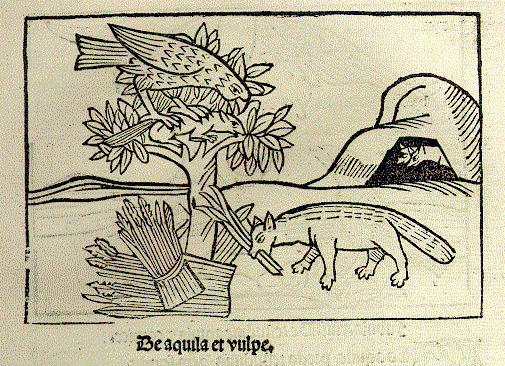CLAS 357
Phaedrus, Fables (continued)
February 14, 2024

"The Wolf and the Lamb" (German edition of Aesop, ca. 1479)
Study Guide for Examination #1 (Wednesday, February 21)

Phaedrus, Fables 1-2 (cont.)
- (powerless) broader populace in Phaedrus' world: 1.15, "What the Ass Said to the Old Shepherd"
Fables 1.15 (incursion of soldiers; the wise ass's resignation)
Revolutions, reversals of regimes and rulers,
For the moneyless masses mean a change of masters,
No more. I’ll tell you a tale in illustration . . .
". . . Suppose that these soldiers
Take me as loot: are they likely to load me
With my present packsaddle plus another?'
"Can't be done," said the dotard. "What difference, then,
Does it make to me what man is my master,
If I'm still only burdoned with a single saddle?"
Fables 1.30, "The Frogs Afraid of the Battle of the Bulls" (the sage frog)
"But when two contend for control of the meadows,
The beaten bull will betake himself here,
Heading for our haven as a hiding place,
And batter us to bits with his hard hooves.
So we are affected by their furious feuding."

- possibility of rebellion (?): 1.28, "The Fox and the Eagle"? ("It is good policy for the great and grand / To treat their lessers with respect. Revenge / Is available to all, regardless of rank, / And you never know who may prove to be clever.")
Phaedrus, Fables 3-5: continuation of political themes of Books 1-2 (safety-net of fables); poet's claims of independence from Aesop (freedman-poet forging a literary identity = poetic monument, i.e. name/fame/memory/voice/identity); humorous fables
- Fables 3, Prologue: to Eutychus, busy freedman (?)/businessman, contrasted with poet ("minded to enter the mansion of the Muses . . . immune to the lure of money"); target audience (?) ("if they go unread, / At least I will pass the pleasure to posterity")
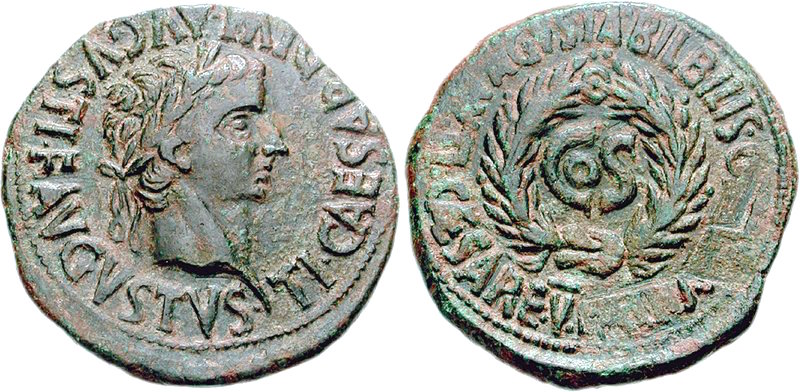
Coin of Tiberius (TI • CAESAR • DIVI • AVGVSTI • F(ilius) • AVGVSTVS) with Sejanus's name removed on reverse (damnatio memoriae), 31 CE
Fables 3, Prologue (Phaedrus' expanded program; individual vs generic targets & "plausible deniability")
Now let me give you a little lesson
On why fables, as a form, were first invented.
Slaves are exposed to incessant hazards.
Unable openly to express what he wanted,
One of them projected his personal opinions
Into fictional fables and found shelter
From carping critics in comic inventions.
The lane that he left I’ve enlarged to a highway
And thought up more themes than he bequeathed,
Though some have got me into terrible trouble.
If my accuser, my judge, and my jury
Had been any other than simply Sejanus,
I’d have openly acknowledged my evident errors,
And I wouldn’t be worrying about saving my name.
I express in advance the hope of being excused.
If people persist in being a prey to suspicion
And mistakenly take themselves to be my targets,
When I’m aiming at the obvious errors of all,
The cause is clear: their consciences are guilty.
If I give them pain, I apologize profusely:
My purpose is not to pillory any person,
But to illustrate life and the ways of the world.
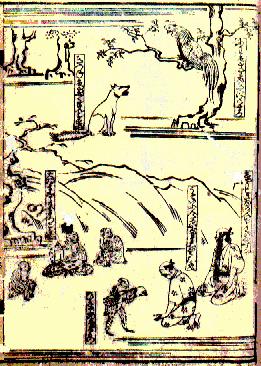
Woodblock print illustration of Japansese translation of Aesopica (1659)
Fables 4, Prologue (Phaedrus' independence, Romanization)
Since, then, Particulo, you're partial to fables
(Which I call Aesopic, not actually Aesop's,
Since I've made more than the few he fathered,
Following his form, but with modern content)
You can now read the following, my fourth volume.
Fables 5, Prologue
I’ve already acknowledged what I owed Aesop.
And if anywhere I insert his name again,
I’m doing it purely to profit from his prestige.
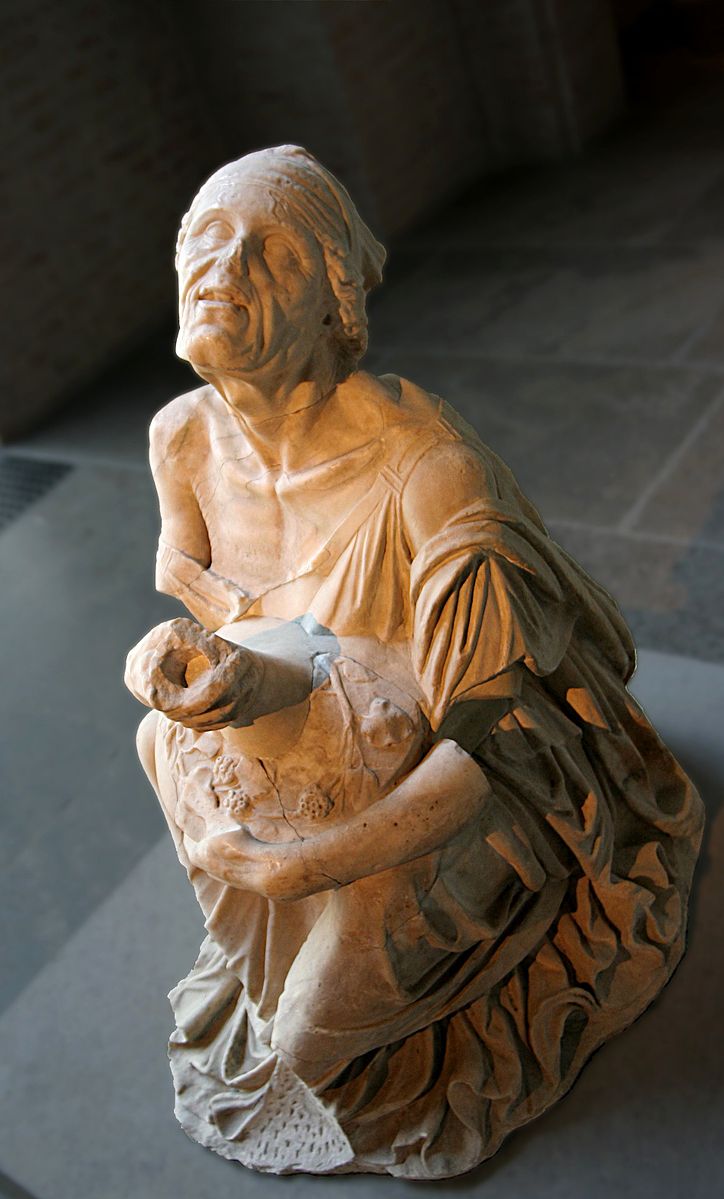
Old woman clutching wine jug (Roman copy of Hellenistic Statue, ca. 200-180 BCE)
- readers required to fill in (political) blanks, e.g. 3.1, "What the Old Woman said to the Wine Jar"
Fables 3.1
An old woman once caught sight of a wine jar
Which the drinkers had drunk and left empty.
A fine Falernian this flask had held,
And its dregs still diffused a delicious aroma.
As she eagerly sniffed the scent, she sighed,
"Delightful perfume, how perfect in your prime
You must have been, when your remains are so marvelous."
To people who know me, the point will be plain.
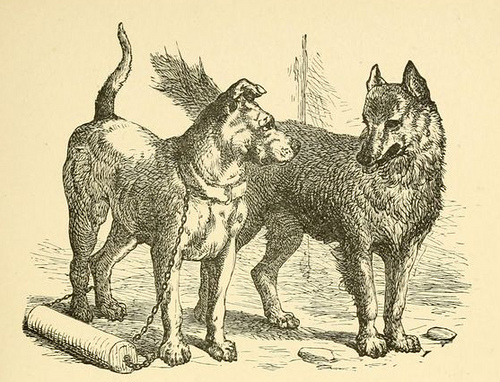
Illustration from Tenniel's Aesops's Fables (1848)
- sweetness of (lost) freedom theme: cf. security/freedom swap in autocratic movements; pitfalls of a (vulnerable) libertus?
Fables 3.7, "The Wolf and the Sleek Dog" (conditions of dog's service)
This fable affirms the sweetness of freedom.
. . .
“So, dog, you keep doing what does you good.
Personally, I prefer to rough it in my freedom.
You wouldn’t catch me consenting to be king,
If it made me no longer master of myself."
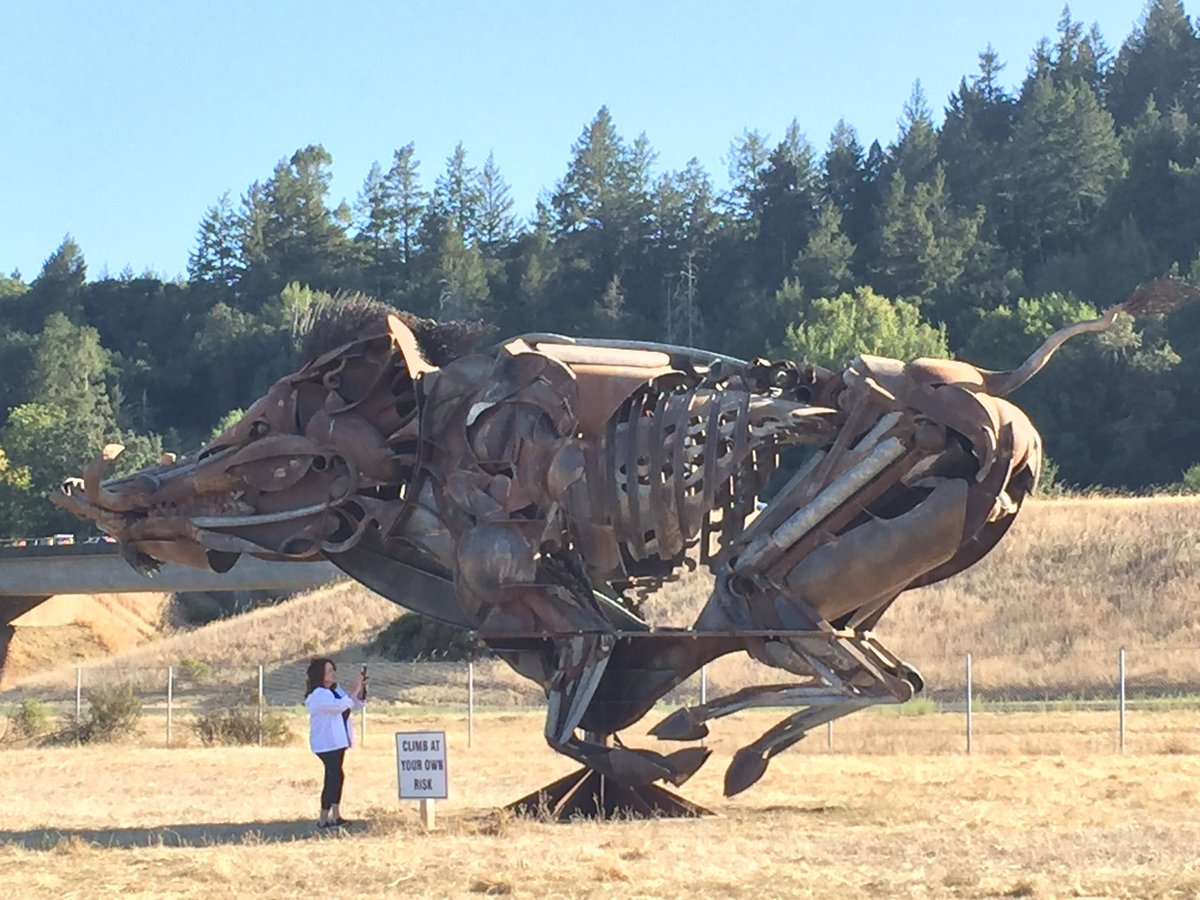
Wild boar sculpture, Geyserville, CA
Fables 4.4, "The Horse and the Wild Boar" (water rights dispute, horseman)
Then the horse morosely muttered, "How misguided,
What a fool I feel! I was full of resentment
And vowing vengeance for a negligible
nuisance,
And here I end up exploited forever."
The story should serve as a salutary warning
To the angry and aggressive that it’s always better
To bear with being hurt without hitting back
Than be put in the power of another person.
- autocracy & capricious power, autocrat as vicious predator (+ sycophants, dishonest subjects); cf. monarchy/principate

"Does my breath smell?"
Fables 4.13A, "The Reign of the Lion" (precarious double bind of speaking freely under autocratic rule)
There are times when the penalties for speaking out
And for keeping quiet are equally awful . . .
. . . The ape answered, "Beautiful, beatific.
Something like cinnamon, or the subtle spices
That smell so glorious on the altars of the gods."
Lion's response?

"Who am I and who are these you see at my feet?"
Fables 4.13B, "The King of the Apes" (two travelers; speaking truth to the Emperor-Ape?)
“Nothing benefits more than to tell the truth.”
Of course, we should commend this moral:
But sincerity sometimes has disastrous results . . .
liar's response to King of Apes' query?
. . .
"If this sly liar
Gets a big reward, I'm bound to be given
An even bigger if I tell the truth."
The apes' leader repeated his query:
"Who am I, and who are these you see at my feet?"
"You're an ape, as always, and all those assembled
Are apes also, and always will be."
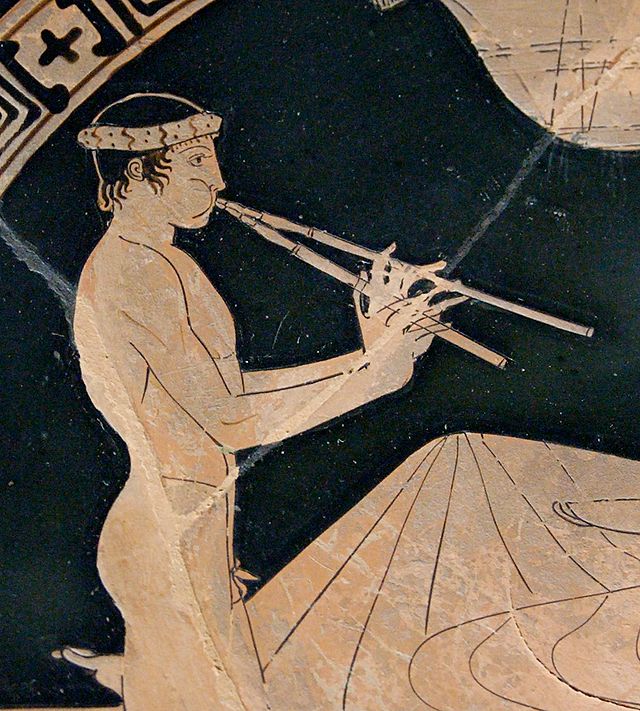
Youth playing aulos/tibia (Attic red-figure ca. 460-450 BCE)
Fables 5.7, "King the Flute Player": false praise of King (princeps, "first citizen"; cf. principate) with broken tibia (double meanings), accompanist of Bathyllus the dancer (Augustan theater): chorus "Rejoice, Rome, / Your state is safe, now the king has recovered"; audience reaction(s) to King's blowing kisses?
Fables 5.7 (moral – imperial power?)
When a frivolous mind is made complacent
By the wayward winds of popular applause
And assumes an attitude of arrogant assurance,
Its pretentions are easily pricked by ridicule.
King ejected from theater!
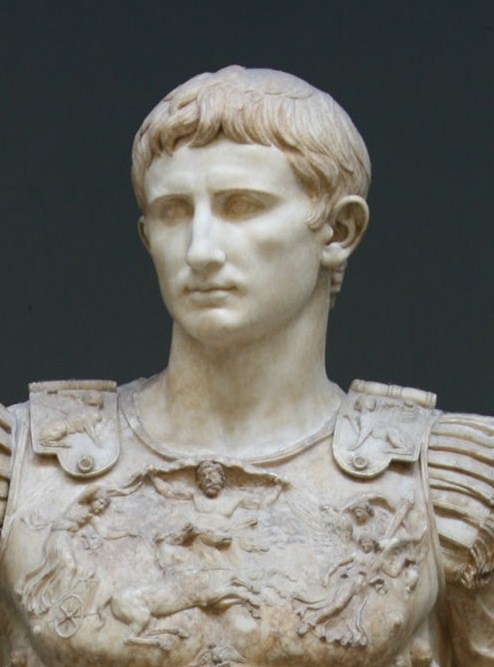
Augustus of Prima Porta (1st century BCE/CE)
- Fables 3.10, "The Poet, on Believing and not Believing": flattering (?) portrait of Augustus (cf. Fables 2.5, "Tiberius' Words to an Attendant", emperor as exceptional creature/fabulist in world of liars, informers, etc.?); legacy hunting (freedman) secretary's plot (cf. Hippolytus, Phaedra & Theseus in Greek tragedy)?
Fables 3.10 (believing or not believing the wife/secretary)
To believe and not to believe, both are dangerous:
Here’s a brief example of each extreme . . .
. . . Augustus cut through the thicket of calumny
And detected the true foundation of the facts . . .
. . . Neither accept nor reject a report
On the spot. The most improbable people,
Outwardly innocent, can be very vicious;
And those far from fault can be fooled and framed.
Let the gullible be guided by this good advice,
And not let others influence their opinions.
The motives of men are many and various:
They can hate and harm you as much as help,
So trust no one you don't know.
I’ve gone into this question at greater length
Than usual, since a few friends have informed me
That they find my fables somewhat too short.
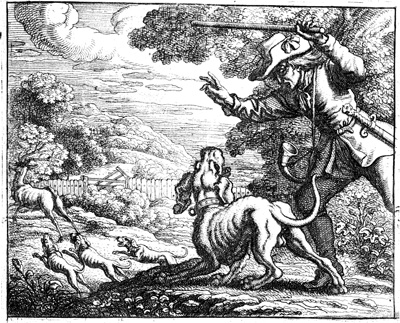
Illustration from Barlow's Aesop's Fables (1666)
- closing the collection: Fables 5.10, "The Old Dog and the Hunter" (cf. ancient Cynics = "Dogs"/social critics)
"It's strength, not spirit, that's deserted me, master.
If you want to blame me for what I've become,
you should give me credit for what I was?"
No need, I fancy, to stress the message.
